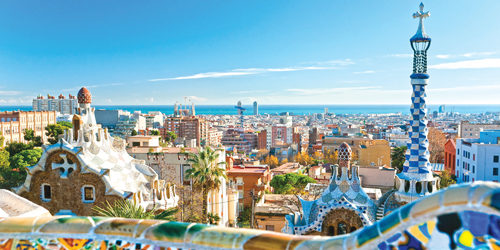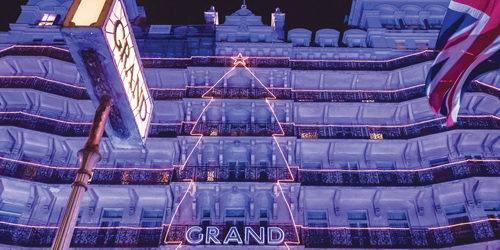
Barcelona’s architecture oozes with individuality. The stately buildings running alongside its wide, grid-like streets and avenues of dappled plane trees are punctuated with fantastical neo-gothic structures, each one with a legion of hook-nosed gargoyles peering down at me.
Rambling through Parc de la Ciutadella, I spy chartreuse canaries flitting between the Mediterranean fl ora, their colour popping against an uncharacteristically pale sky (everyone I meet jokes that I’ve brought the British weather with me). The waterfall monument, crowned with a golden statue of Aurora in a horse-drawn chariot, and flowing with vivid blue water, holds my attention for some time. This is easily trumped, however, by the eye-popping Sagrada Familia, designed by Catalan Modernist architect Antoni Gaudi.
It’s still surrounded by cranes, despite its construction beginning in 1882. By the time the surreal, swirling Catholic church is finally completed in 2026 – the centenary of Gaudi’s death – it will have taken longer to build than the Great Pyramid of Giza, but I’m definitely witnessing another Wonder of the World in the making.
I head back towards the Old Town to meet with Belgian entrepreneur Mark Mekki, founder of travel experience curation and technology company, Ode to Joy (library.odetojoy.life). He shows me the sweeping views from the terrace of his rooftop office.
Putting my awe to one side for the moment, I ask him about Barcelona’s business climate. “We moved here for the lifestyle,” he says.
“What I found was an enormous ecosystem of entrepreneurship. It’s becoming one of the start-up hubs of Europe – of the world, even. It’s a very friendly city to come into as an entrepreneur, very low-risk, with a lot of potential for funding and making contacts. There’s still a perception about Spain and Catalonia that red tape will be an issue, but actually it’s fairly simple now.”
What else makes Barcelona so conducive to starting up a new business? “There are a lot of incubators, and there’s a lot of free or cheap office space – the amount of co-working space in Barcelona is only second to Berlin and San Francisco, I believe,” Mekki reveals.
“However, it’s more about the mentality than the infrastructure, which is grounded in the fact that Spain, and Catalonia in particular, was hit hardest by the recession, so people had to go out and try different things. This mentality crept in - you have nothing to lose, so try something crazy and see if it sticks. People are coming up with these ideas, and venture capitalists are saying: ‘that could work worldwide, let’s give you a million euros and just roll with it.’”
For meetings and conferences, Barcelona’s innovative streak makes it an obvious choice for holding international tech and digital events. For example, the city is the annual host of the Mobile World Congress – the world’s largest gathering for the mobile industry– and will stage the Smart City Expo World Congress this month. Last year, the Catalan capital was named the second-most popular city for meetings in the world, having hosted 182 meetings in 2014, with 127,469 participants – it was pipped to the post only by Paris.
And, there is no shortage of interesting, creative company incentives to reward employees with. For example, local experience provider, CoCoA (cocoa.network) runs an Inspirational Hubs programme. It allows corporate groups to visit Barcelona’s surrounding farms and vineyards to partake in agricultural activities, meeting with locals and taking in an authentic aspect of Catalan life. It’s also possible to treat football fans with a VIP tour of Camp Nou stadium, the home ground of Barcelona FC – Ode to Joy can even arrange a private dinner on the actual pitch.
For me, the best way to experience Barcelona is on foot, with my neck permanently craned upwards, whether I’m winding my way through the narrow alleyways of its Old Town, or stumbling upon yet another architectural remnant from the brilliant creatives that have made this city what it is today.
Made In Barcelona
Five ingenious innovations from Barcelona-based start-ups
Wallapop – A secondhand marketplace app that allows users to buy and sell items by connecting with people in their neighbourhood. It has attracted €150 million of investment and has been downloaded around 25 million times.
Kantox – A foreign exchange platform, Kantox enables peer-to-peer trading, and alerts users of the best trading times. It has handled more than a million transactions since it was founded five years ago.
Smadex – Creates and distributes mobile advertising for companies. Last year, its monthly revenue rose to €300,000.
Kompyte – An intelligence platform that gives marketing teams real-time information about competitors’ latest moves.
Trip4Real – Recently purchased by Airbnb, Trip4real is a Barcelona-based booking company that connects travellers with local activities and experiences in more than 70 European cities.
Eat Here
Can Cisa/Bar Brutal – Tucked away on a quiet street in the Old Town, this popular wine bar serves delectable tapas amid a cool, buzzy atmosphere.
cancisa.cat
Hisop – Head here for beautifully presented modern Catalan cuisine crafted from seasonal ingredients.
hisop.com
Bacoa Burger – Lowhanging exposed lightbulbs and metal stools adorn in this trendy burger bar, where you grab a pencil, put a cross next the fillings you’d like – all of them locally sourced – and wait for your order to be served to your table.
Top Four Event Spaces
CCIB
Covering 100,000 sqm, with the capacity to welcome 15,000 delegates, the clean lines of this convention centre cut a sharp silhouette on the seafront district of Diagonal Mar.
Catalan History Museum
The museum’s rooftop terrace overlooks boats bobbing in Barcelona’s old port from one side and staggering city views from the other. It has space for 600 guests.
Fundacio Joan Miro
Set on Montjuic hill, the galleries of this contemporary art institute pop with bold colours and thought-provoking sculptures. These can be hired for events; other spaces include an 180-capacity auditorium and a cypress garden.
Casa Batllo
A dream-like Gaudi building in the middle of the city, this unique building’s roof looks like it’s crafted from a dragon’s skin, while its balconies resemble sharks’ jaws. For a banquet to remember, hire the magical Noble Floor.
Hotel Brand On The Radar
Room Mate Hotels
With four properties in Barcelona, this international boutique hotel brand targets those seeking ‘affordable luxury’. Each one has an individual visual theme that reflects its locale as well as its ‘character’ - the idea being that visiting the hotel is like staying with a friend (hence why each hotel is given a person’s name).
When I checked in to the 81-room Room Mate Anna, I was greeted by staff sporting orange heart-shaped badges with a word on them relating to one of their hobbies or interests (just in case you’d like a conversation prompt). Aside from the striking scarlet design of my Deluxe room in Room Mate Anna – located a minute’s walk from Passsig de Gracia metro station – the
highlight of my stay was the WeMate wifi hub. When you leave the hotel for the day, you’re handed a palm-sized wifi-emitting device that connects to up to ten smartphones. It feels liberating to use Google Maps without worrying if, like me, your data roaming is permanently turned off abroad to prevent gut-wrenching phone bills.
I also appreciated the unusual wasabi-flavour toiletries and that breakfast was served right up until midday – a brand standard across all hotels, along with the WeMate hub.
Room Mate Carla – situated opposite the famous neo-gothic Casa Thomas – has a sleek blue design, 81 bright white rooms with bold motifs, and two meeting rooms, one of which has views
out on to the hotel’s peaceful ground floor terrace, which is often used for meetings in the sunshine.
Room Mate Anna and Room Mate Carla opened up in Barcelona this summer.
Visit room-matehotels.com






